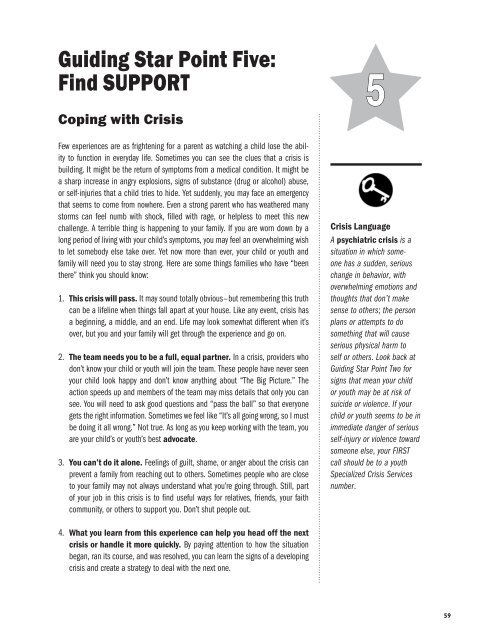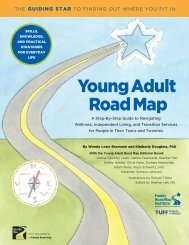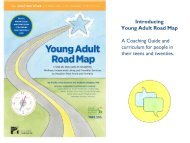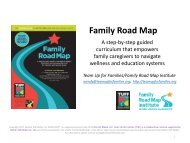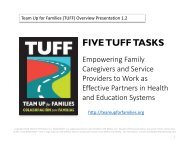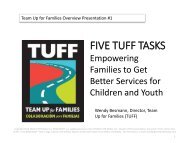Family Road Map Guide
You also want an ePaper? Increase the reach of your titles
YUMPU automatically turns print PDFs into web optimized ePapers that Google loves.
Guiding Star Point Five:<br />
Find SUPPORT<br />
Coping with Crisis<br />
Few experiences are as frightening for a parent as watching a child lose the ability<br />
to function in everyday life. Sometimes you can see the clues that a crisis is<br />
building. It might be the return of symptoms from a medical condition. It might be<br />
a sharp increase in angry explosions, signs of substance (drug or alcohol) abuse,<br />
or self-injuries that a child tries to hide. Yet suddenly, you may face an emergency<br />
that seems to come from nowhere. Even a strong parent who has weathered many<br />
storms can feel numb with shock, filled with rage, or helpless to meet this new<br />
challenge. A terrible thing is happening to your family. If you are worn down by a<br />
long period of living with your child’s symptoms, you may feel an overwhelming wish<br />
to let somebody else take over. Yet now more than ever, your child or youth and<br />
family will need you to stay strong. Here are some things families who have “been<br />
there” think you should know:<br />
1. This crisis will pass. It may sound totally obvious–but remembering this truth<br />
can be a lifeline when things fall apart at your house. Like any event, crisis has<br />
a beginning, a middle, and an end. Life may look somewhat different when it’s<br />
over, but you and your family will get through the experience and go on.<br />
2. The team needs you to be a full, equal partner. In a crisis, providers who<br />
don’t know your child or youth will join the team. These people have never seen<br />
your child look happy and don’t know anything about “The Big Picture.” The<br />
action speeds up and members of the team may miss details that only you can<br />
see. You will need to ask good questions and “pass the ball” so that everyone<br />
gets the right information. Sometimes we feel like “It’s all going wrong, so I must<br />
be doing it all wrong.” Not true. As long as you keep working with the team, you<br />
are your child’s or youth’s best advocate.<br />
3. You can’t do it alone. Feelings of guilt, shame, or anger about the crisis can<br />
prevent a family from reaching out to others. Sometimes people who are close<br />
to your family may not always understand what you’re going through. Still, part<br />
of your job in this crisis is to find useful ways for relatives, friends, your faith<br />
community, or others to support you. Don’t shut people out.<br />
5<br />
Crisis Language<br />
A psychiatric crisis is a<br />
situation in which someone<br />
has a sudden, serious<br />
change in behavior, with<br />
overwhelming emotions and<br />
thoughts that don’t make<br />
sense to others; the person<br />
plans or attempts to do<br />
something that will cause<br />
serious physical harm to<br />
self or others. Look back at<br />
Guiding Star Point Two for<br />
signs that mean your child<br />
or youth may be at risk of<br />
suicide or violence. If your<br />
child or youth seems to be in<br />
immediate danger of serious<br />
self-injury or violence toward<br />
someone else, your FIRST<br />
call should be to a youth<br />
Specialized Crisis Services<br />
number.<br />
4. What you learn from this experience can help you head off the next<br />
crisis or handle it more quickly. By paying attention to how the situation<br />
began, ran its course, and was resolved, you can learn the signs of a developing<br />
crisis and create a strategy to deal with the next one.<br />
59


